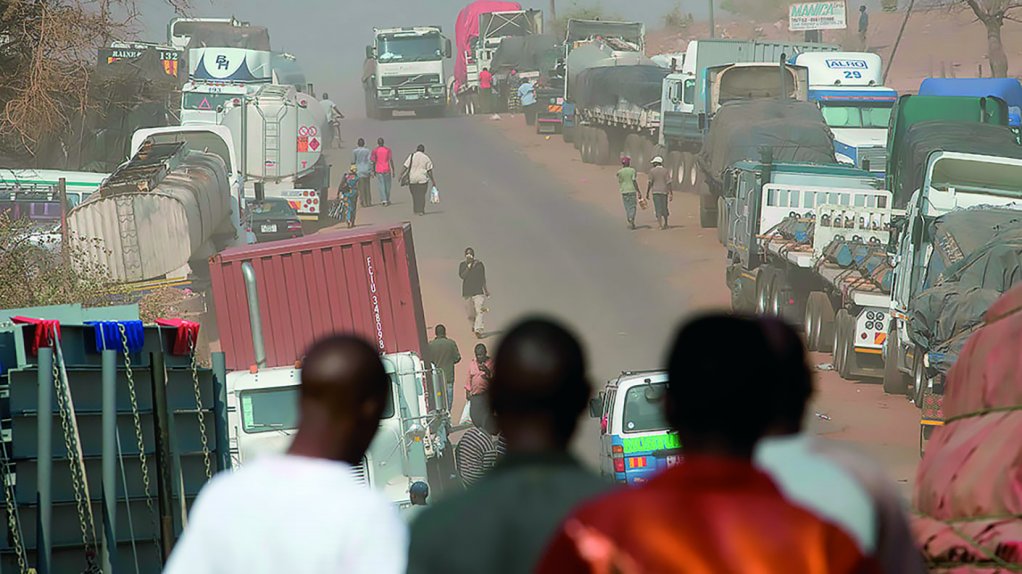Delays along key SADC trade corridors costing ‘billions’ in trade – study
A reduction in delays along Southern Africa’s three busiest trade corridors – the Trans-Kalahari Corridor (TKC), between Namibia, Botswana and South Africa; the North–South corridor (NSC), between Tanzania and South Africa; and the Maputo Corridor, between Mozambique and South Africa – would significantly boost overland fleet capacity and potentially lift the value of trade between the frontier markets by “billions”, a recent study found.
Presenting the findings of the study to the Southern African Transport Conference on Tuesday, Cross-Border Road Transport Agency road transport researcher Bevuya Mdlankomo said cross-border road transport in the Southern African Development Community (SADC) region faced a suite of challenges, including high operational costs, inadequate infrastructure, inefficient regulatory and corridor management systems, accidents and delays and environmental pollution.
These impacted on the sustainability, productivity, efficiency, quality and cost of transport services, as well as the cost of products traded in the region.
“The cost-benefit calculations performed indicated potential significant logistics costs savings that could be realised with focused cross-border road transport and trade facilitation initiatives that have the potential to reduce delays on regional corridors.
“Most of the challenges experienced in corridors culminate in delays, which have a negative impact on road transport operators and the economy,” he noted.
According to the study, a reduction in delays led to increased trade volumes and earnings per corridor, as well as the improved facilitation of trade, regional integration and economic development.
Based on hypothetical interventions to reduce delays on only the South African portion of each of the regional corridors, the Maputo Corridor would realise the most dramatic return-on-investment, with the implementation of interventions along the South African portion of this corridor expected to increase the trade value through the Lebombo border post by about five times.
By reducing delay times at weighbridges, border posts and toll gates by “fairly small” reductions of 70 minutes across the corridor, this would result in the existing fleet of trucks operating on that route potentially being able to undertake 5.41 more trips per vehicle and, thus, 5.41 more trade value passing along the corridor.
“The potential increase in trade as a result of a possible reduction in border post, toll gate and weighbridge delays amounts to a staggering R118-billion,” Mdlankomo held.
The envisaged cost-savings impacts would not be so dramatically felt on the region’s remaining two trade corridors, as only 16.6% and 36% of the TKC and NSC respectively fell within South Africa’s jurisdiction.
A total reduction in delays of 60 minutes on the South African portion of the TKC resulted in an additional transport fleet capacity that could complete an additional 0.76 trips per vehicle a year, assuming that the improvement in efficiency resulted in additional capacity at the Skilpadshek border post.
This established that a potential increase in trade, owing to time savings on the South African portion of the corridor, would amount to R992.7-million in commodity value.
“As only 16.6% of the travelling distance is within South African jurisdiction . . . if similar improvements are possible along the entire route, a significant reduction in logistics costs can be expected.
“However, if the entire corridor cannot accommodate increased freight volumes, then the investment will be fruitless, since the impediment – time delays – will merely shift to another point along the corridor,” he noted.
The cost benefit calculations of 90-minute time savings on the NSC would increase additional trips per vehicle by 0.31 a year and impact positively on macroeconomic trade by some R13.24-billion.
As only 36% of the travelling distance on this corridor was within South African jurisdiction, if similar improvements were made along the entire route, a significant reduction in logistics costs could be expected.
Mdlankomo reiterated that interventions should, as far as possible, be introduced over the entire corridor and not be limited to the South African portion of the corridor.
“It should also be noted that by eliminating a delay in one portion of the corridor only, one creates another delay elsewhere on the corridor, thus, the net effect will be close to nothing,” he cautioned.
PRIORITY NUMBER ONE
Elaborating on the study’s recommendations, Mdlankomo maintained that reducing corridor delays should become “priority number one” for the SADC region if effective and efficient cross-border road transport movement facilitation was to be achieved.
Furthermore, attainment of regional aspirations on trade, economic development and regional integration required a regional approach that saw regulatory authorities “clearly appreciating” the effect of current delays on cross-border road transport movement.
Among specific interventions that could be implemented by the SADC region to reduce cross-border delays, the report advised that there be complete implementation of international transport agreements.
“A strong departure point for the SADC region is for all member States to fully operationalise international transport agreements, which would set a solid ground for member States to tackle fragmentation, lack of harmonisation and regulatory differences.
“This would also address cross-border movement challenges, constraints and nontariff barriers, which significantly contribute to cross-border delays,” read the study.
It further recommended that political will to ease the cross-border movement of goods be harnessed, that local trade authorities be capacitated, that roles of regional monitoring platforms be revised and that accreditation systems for transport operators and traders be introduced.
Law enforcement activities at toll gates should also be combined to reduce stoppages on corridors without necessarily compromising compliance.
“Through concerted effort and political will, the SADC region [can], one day, achieve sufficient progress with regard to reducing corridor delays – a feat that would go a long way towards enabling sustainable cross-border road transport movement in the region,” Mdlankomo concluded.
Comments
Press Office
Announcements
What's On
Subscribe to improve your user experience...
Option 1 (equivalent of R125 a month):
Receive a weekly copy of Creamer Media's Engineering News & Mining Weekly magazine
(print copy for those in South Africa and e-magazine for those outside of South Africa)
Receive daily email newsletters
Access to full search results
Access archive of magazine back copies
Access to Projects in Progress
Access to ONE Research Report of your choice in PDF format
Option 2 (equivalent of R375 a month):
All benefits from Option 1
PLUS
Access to Creamer Media's Research Channel Africa for ALL Research Reports, in PDF format, on various industrial and mining sectors
including Electricity; Water; Energy Transition; Hydrogen; Roads, Rail and Ports; Coal; Gold; Platinum; Battery Metals; etc.
Already a subscriber?
Forgotten your password?
Receive weekly copy of Creamer Media's Engineering News & Mining Weekly magazine (print copy for those in South Africa and e-magazine for those outside of South Africa)
➕
Recieve daily email newsletters
➕
Access to full search results
➕
Access archive of magazine back copies
➕
Access to Projects in Progress
➕
Access to ONE Research Report of your choice in PDF format
RESEARCH CHANNEL AFRICA
R4500 (equivalent of R375 a month)
SUBSCRIBEAll benefits from Option 1
➕
Access to Creamer Media's Research Channel Africa for ALL Research Reports on various industrial and mining sectors, in PDF format, including on:
Electricity
➕
Water
➕
Energy Transition
➕
Hydrogen
➕
Roads, Rail and Ports
➕
Coal
➕
Gold
➕
Platinum
➕
Battery Metals
➕
etc.
Receive all benefits from Option 1 or Option 2 delivered to numerous people at your company
➕
Multiple User names and Passwords for simultaneous log-ins
➕
Intranet integration access to all in your organisation





















